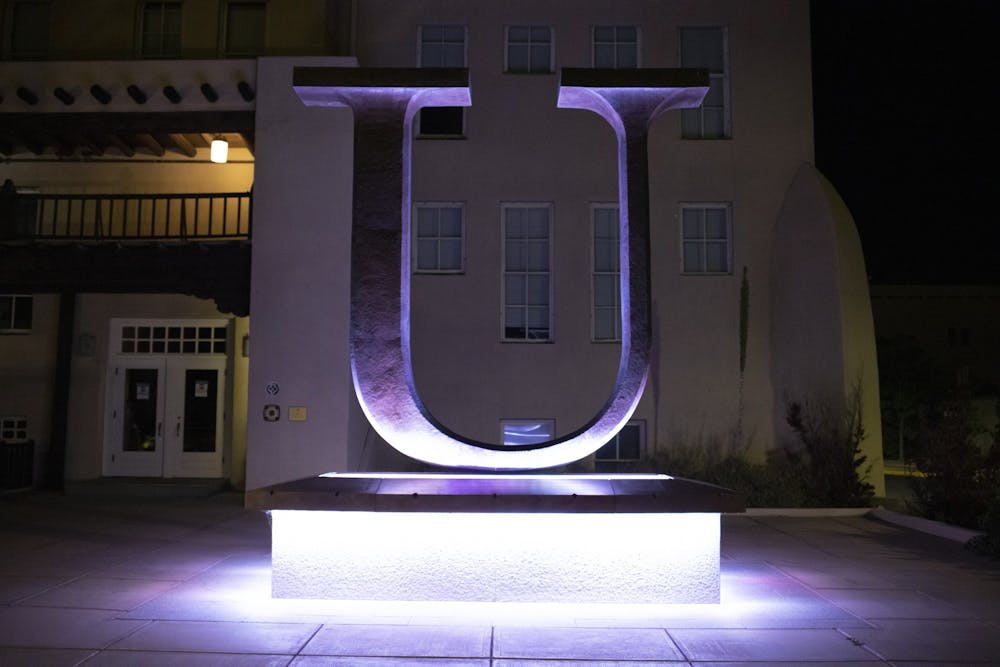The University of New Mexico’s Student Fee Review Board (SFRB) voted to hold fees steady for fall 2021, despite calls for reductions amidst the coronavirus pandemic.
On Oct. 25, the SFRB — after more than 10 hours of deliberations — approved the fall 2021 student activity fee recommendations on a unanimous 7-0 vote.
Student activity fees are charged alongside tuition to all students registered on main campus and at the Health Sciences Center.
These fees are assessed per capita — as enrollment increases, the total budget expands, giving the board more money to recommend for allocation.
Student activity fees do not include the student government fee, which is a fixed dollar amount approved separately by the Board of Regents for the undergraduate and graduate student government, nor the facility/information technology debt service fee.
This year, total enrollment dropped slightly (down 2.4%, or 548 students) but there was a considerable increase in graduate students (19.3%), and SFRB funds available exceeded requests.
On the second day of deliberations, the SFRB discussed lowering student activity fees from 1.5% to 1% but ultimately decided to not lower them, billing the decision as a way to ensure that their reserves remain high. The decision was made despite calls from students for relief based on the financial strain imposed by the pandemic.
Especially notable among this year’s appropriations was the establishment of a new Asian Pacific American Culture Center (APACC). Though they did not receive the full $171,679.50 they requested, the SFRB did recommend they receive $72,650 to get the cultural center established.
According to the APACC application, the funds were designed to support a professional staff person, student support staff and operating costs. The mission of the center would be to create community and foster success in students of APIDA (Asian, Pacific Islander and Desi American) heritage.
In addition to the APACC not receiving all of the funding they requested, ENLACE, the ASPIRE program, Student Publications and Athletics were also funded at a rate lower than they had applied for.
ENLACE — a program that provides tutoring and mentorship for low income high school students — was the only program the SFRB recommended less funding than what they received last year. ENLACE was reduced by $6,100 from last year’s funding down to $30,000. The program had applied for a $30,000 increase this year.
For the second year in a row, the ASPIRE (Center for the Advancement of Spatial Informatics Research and Education) program approached the board for $212,676 in first-time funding to establish a research center focused on promoting Geographic Information Science. The funding was to go to equipment, as well as to staff and graduate assistant salaries. The board rejected ASPIRE’s request for recurring funding but recommended an appropriation of $27,860 in one-time funding.
Get content from The Daily Lobo delivered to your inbox
ASUNM President Mia Amin and board members Sall Ahmadian and Victoria Peña-Parr spoke in favor of the cut.
“We can’t just give money blindly to people,” Peña-Parr said.
After considerable debate, Student Publications — the organization that funds the Daily Lobo, Limina and Conceptions Southwest — was also whittled down, receiving $20,000 less than they requested but more than $51,500 than they received last year.
Many board members expressed concerns about the large multi-year deficit Student Publications have rolled over for several years.
“If the Daily Lobo were a business, it would’ve shut down years ago,” board member Ricardo Hill said early on in the deliberations.
Other, much larger appropriations from the SFRB, such as $2.24 million for the Student Union Building and $4.35 million for Student Health and Counseling, were fully funded by the SFRB.
Additionally, the Student Government Accounting Office and LGBTQ Resource Center were added to a list to add an increase of one-time funding for the next fiscal year.
Toward the end of deliberations, the board discussed whether or not they should go back and reconsider adding additional funds from the reserves to some programs.
However, a number of members opposed the idea, with Hill, Ahmadian, Peña-Parr and Amin objecting to the further allocation of funds.
In particular, Hill stated that if any additional funding was given to groups, with the fact that some programs didn’t get their full amounts, that it could be seen as the SFRB beginning to “assume which group needs more help than others."
Thus, the board agreed to not recommend any additional funding to any of the programs, with the money that was left over reverting back to the SFRB’s reserves.
One area of contention came with Athletics’ request for nearly $3.6 million, which the board agreed to adjust down $100,000 to $3.47 million.
Hill, Peña-Parr and Emma Hotz said they were concerned that the verbiage contained within Athletics’ proposal wasn’t specific enough.
Thus, they recommended a change to how SFRB budget proposals are submitted in the future, with any line item above $30,000 needing to be clarified in detail. The board asserted that if next year’s proposals don’t include the necessary information, they would be automatically cut.
Peña-Parr, Hotz and GPSA President Nikhil Reddy expressed concerns about the Athletics budget, but the board ultimately agreed to proceed to a final vote without revisiting the allocation. Some board members said that it wouldn’t be fair to return to the Athletics budget given that they had over a month to ask the department questions about how the funds would be used.
The new SFRB recommendations will be presented to the Budget Leadership Team on Nov. 19, where that committee will either make changes or approve of the SFRB’s new budget before submitting it to the Board of Regents for approval.
Spencer Butler is a beat reporter at the Daily Lobo. He can be contacted at news@dailylobo.com or on Twitter @SpencerButler48
Lissa Knudsen is the news editor at the Daily Lobo. She can be contacted at news@dailylobo.com or on Twitter @lissaknudsen
Jesus Mata is a freelance reporter at the Daily Lobo. He can be contacted at sports@dailylobo.com or on Twitter @JesusMataJr99






